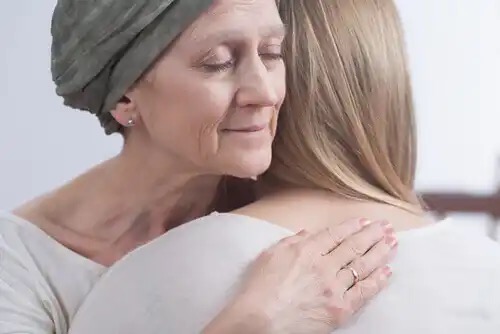How to Stay Calm When a Loved One has Cancer


Written and verified by the psychologist Rocío García Garzón
Cancer is an overwhelming reality. We all know what it is and hear the term daily. However, the word remains capable of creating a great deal of fear, anxiety, and stress. More particularly, when you learn that a loved one has cancer.
The incidence of cancer in the current population is extremely high. The World Health Organization (WHO) warns of its increase. They suggest the 14 million currently diagnosed cases will rise to about 22 million by the year 2030. Consequently, cancer will be a problem facing many, both sufferers and their relatives.
When you experience this disease first-hand, as you do when a loved one suffers from it, you face one of the hardest experiences of your life. Without a doubt, it’s one of the most painful situations a human being can ever go through.
That’s because of its highly negative connotations as well as the extreme levels of uncertainty it causes. Consequently, staying calm is fundamental to facing this ordeal and overcoming it.
“The greatest discovery of my generation is that a human being can alter his life by altering his attitudes.”
-William James-

The impact of diagnosis
When a person receives a cancer diagnosis, they and their entire social circle are greatly affected psychologically. Because, as everyone knows, cancer is an extremely serious disease. In addition, its evolution and development are unpredictable.
Despite medical advances and the increasing number of cancer survivors today, the disease still inevitably evokes overwhelming feelings and thoughts of death. Hence, you tend to automatically think dramatic thoughts. These sap your energy and, at the same time, make you feel immensely sad.
You feel tired, sad, anxious, angry, and, above all, frustrated. For this reason, you may not make the best decisions. Indeed, often, the diagnosis causes a crisis in both the patient and those around them.
How to stay calm when a loved one has cancer
- Diagnosis is the moment of impact. Furthermore, in many instances, it’s the most complicated time. It’s when reality hits home. However, to process this one life-changing moment, the sufferer will need many more. For this reason, you need to have patience with a loved one with cancer. Because you have to deal with all their doubts and fears.
- Knowing oneself is the key to emotional management. According to neuroscience, we generate about 60,000 thoughts a day. Most of these are negative, repetitive, and related to the past. The worst thing about this is that you tend to believe them. Therefore, when someone receives a cancer diagnosis or, indeed any negative news, such thoughts occur more frequently and intensely in both the patient and family members. For this reason, controlling these kinds of thoughts will mean you’re able to be more helpful to the sufferer.
- The WHO states that our mental health is extremely important for our well-being. According to the journal, The Lancet Psychiatry, about 25 percent of people with cancer develop a mood disorder. This also happens to the people around them. Therefore, it’s important that you don’t neglect yourself and this is something that’s entirely down to you.
- Knowledge is power. As a rule, the first reaction to a cancer diagnosis is fear and bewilderment. This is due to fear of the unknown. Both of these feelings are due to ignorance. Therefore, you’ll help the patient by working out a plan for what comes next.
- It’s inevitable to associate cancer with death. It’s been the same for years. However, the number of cancer survivors is increasing. Nevertheless, it’s a topic that the patient may still need to talk about.
If this is the case, you should listen to them, even if you’re tempted to steer the conversation away from the subject. Furthermore, if the diagnosis is terminal and your intervention becomes palliative, your help at this stage becomes even more important.
“When I was diagnosed with cancer, I knew the only thing I could control was what I ate, what I drank, and what I thought.”
-Kris Carr-
Communication and help
We’re not taught how to die. Indeed, at these times, there aren’t any rules or standards to follow. However, you can provide help. For instance, you can help the patient to say goodbye in the way they want. If they don’t know, you can help them decide.
Communication in these most sensitive moments is of extreme importance. Because, when communication flows, it increases unity. In addition, communication with others means that the care of the patient won’t just fall onto one person.

When the word cancer first appears on the horizon, inevitably there are feelings of fear, anxiety, and helplessness. These are due to the recognition of the fact that life can change forever in just one moment.
The shadow of cancer is often so threatening, that you need to join forces. This means joining together with the doctors, nurses, and psychologists, as well as the patient and all those closest to them. It can really make a world of difference.
“Above all, cancer is a spiritual journey that has taught me resilience and faith.”
-Kris Carr-
All cited sources were thoroughly reviewed by our team to ensure their quality, reliability, currency, and validity. The bibliography of this article was considered reliable and of academic or scientific accuracy.
- Bárez, M. (2002). Relación entre percepción de control y adaptación a la enfermedad en pacientes con càncer de mama. (Tesis doctoral no publicada). Universitat Autònoma de Barcelona, Barcelona. Recuperado de http://hdl.handle.net/10803/4740
- Baider, L. (2003). Cáncer y familia: aspectos teóricos y terapéuticos. Revista Internacional de Psicología Clínica y de la Salud, 3(3), 505-520. Recuperado de http://www.aepc.es/ijchp/articulos_pdf/ijchp-85.pdf
This text is provided for informational purposes only and does not replace consultation with a professional. If in doubt, consult your specialist.








